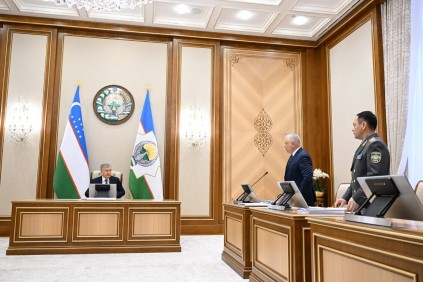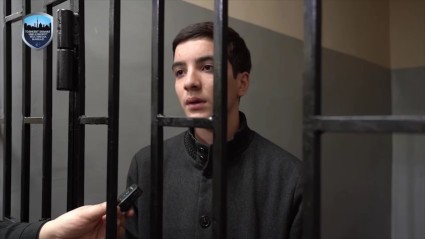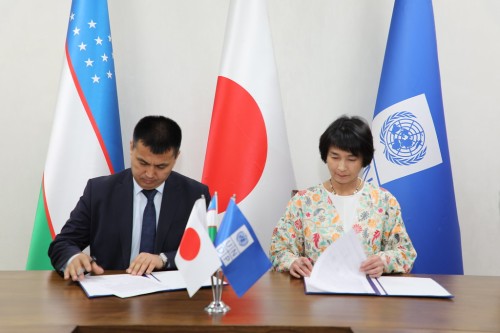The MPs of the Legislative Chamber at its meeting today passed the Urban Renovation Bill in the first reading, the press service of Chamber said.
The bill was presented by Deputy Minister of Justice Makhmud Istamov, who stressed that the project aimed at providing a legal framework for the renovation of outdated housing stock and the creation of a safe, modern and energy-efficient urban environment.
"As everyone knows, due to the growing population and demand for housing in recent years, our country has essentially turned into a large construction site. Hundreds of apartment buildings are being erected in most provinces of the country as part of renovation projects," he said, showing photo examples of completed projects in Bukhara, Kokand and districts of the Jizzakh province.
According to him, despite the large-scale of renovation projects, the country still lacks a special law that would systematically regulate these processes.
"Today, such projects are regulated by general laws and codes - Civil, Urban Development, Land, as well as other laws and by-laws. It is obvious that the absence of special legislation in some cases leads to the violation of the rights of owners," Istamov stressed.
He recalled that the parliament received numerous complaints from individuals about the actions of investors, and criminal cases were opened in the interests of the victims. "All this points to the need for a single law that will systematically regulate relations between owners, investors and government agencies," the deputy minister said.
Old housing stock needs to be renovated
Istamov also emphasized that the existing housing stock requires modernization: there are more than 42 thousand apartment buildings in the country, of which about 17 thousand are two- and three-story buildings.
"Of these, 343 houses have already exceeded their service life and are in an emergency technical condition. As a result, many residents still live in old houses that do not meet modern requirements: the power, gas and water supply systems are outdated, some houses do not even have sewage systems, and the toilets are shared and located on the street,” he said.
According to the analysis, 13.5 thousand modern 7-9-storey buildings can be built on the site of 17 thousand old houses, which will provide housing for three times more residents, as well as significantly save energy and infrastructure resources.
Renovation will be possible only with 100% consent of owners
The bill has defined clear criteria on the basis of which territories can be recognized as subject to renovation. Among them are the presence of the status of a renovation zone in the general plan, complete unsuitability or emergency condition of buildings, as well as factors that significantly affect the social life of the population.
In addition, the bill establishes that mayor offices, residents of the relevant territory or private investors can initiate a renovation project. In this case, to submit an initiative, a notarized written consent of at least 80% of the owners living in the given zone is required. That is, until four fifths of the residents express their consent, no initiative can be put forward.
For comparison, in Turkey, renovation can be initiated with the consent of 51% of the owners, in the Republic of Korea and the Russian Federation - with the consent of two-thirds (66%), and in Japan, Taiwan and the state of Florida (USA) - with 75% of the votes.
In this case, we are talking only about the right to put forward a proposal.
"The main point that should be stressed: the owner's vote is only necessary for making a proposal. If the project or proposal is approved, after the project is approved, a convenient compensation option will be agreed upon with each owner, and a tripartite notarized agreement will be concluded between a mayor office, the investor and the property owner," the deputy minister explained.
He emphasized that no construction work or demolition would be performed until 100 percent consent is reached from the owners. Legal mechanisms against abuse by both investors and owners, as well as a dispute resolution procedure, are also provided.
Compensation and protection of owners' interests
The bill provides for three forms of compensation:
- provision of housing or non-residential premises in a new building at the site of renovation;
- provision of housing in another area;
- payment of monetary compensation in the amount of the market value of the property.
"If an individual temporarily resides in rented housing during the construction period, rental costs shall be fully compensated. In addition, each owner shall be paid a one-time compensation in the amount of 12% of the market value of his property. Thus, each owner is given the opportunity to update the conditions of his life and housing," Istamov added.
Deadlines and state guarantees
The construction period shall be two years. In case of delay, the developer will be obliged to pay a penalty in the amount of 0.5% of the value of the property for each day of delay. A separate directorate will be created for each project - a legal entity that will be responsible for fulfilling the obligations between the investor and the owner.
"If the project is not completed, it will be transferred to the Fund for Support of Renovation in Urban Development, which will attract a new investor and complete the construction. The state guarantees that the project will not remain unfinished," the representative of the Ministry of Justice assured.
According to the deputy minister, owners will be given the opportunity to participate in the project as a shareholder: "If the renovation project involves profit, by agreement with the initiator, the owner can transfer his property to a share at market value and receive profit from the total revenue."














